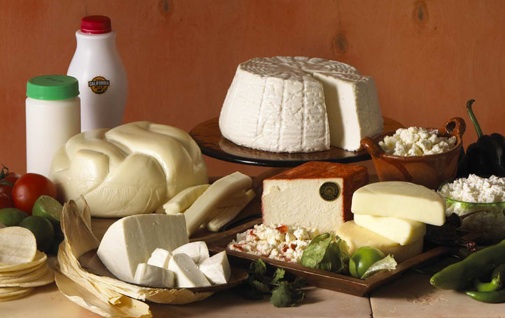- Back to Home »
- cheese »
- Mexican Cheese Primer

Mexican cheese is readily available where I live, not expensive and yet I admit, I am often bewildered when I go to buy it. What's the difference between Cotija and Queso Anejo? Will Panela melt or crumble? If Quesadilla cheese is good for quesadillas, is Enchilado cheese for enchiladas? I have finally made sense of Mexican cheeses, thanks to lots of great information from the California Milk Advisory Board and some generous samples from Cacique, the largest Hispanic cheese brand in the US. Cacique has very detailed descriptions of all their cheeses as well as recipes when you're ready to dig in even further.
Don't be afraid to buy Mexican cheeses because you are not sure what to do with them. They are actually very easy to use and enjoy and often available in supermarkets. And they can be used in all kinds of dishes, not just traditional Mexican cuisine. Many are similar to cheeses you already know, like feta or mozzarella. It was the Spaniards who introduced cows and goats to Mexico as sources of meat and milk, so it's not surprising that Mexican cheeses bear a resemblance to European cheeses, especially ones from the Mediterranean countries including Spain, Italy and Greece.
When thinking about Mexican cheese, it's better to extend the category to Mexican dairy and divide everything into three categories, Fresh Cheeses, Aged Cheeses and Cream. I've listed the most popular and commonly available cheeses first.
FRESH CHEESES
Many fresh, or un-aged Mexican cheeses will soften but do not actually melt. Some of these cheese can be crumbled or fried. Of the fresh cheeses, only Queso Quesadilla and Oaxaca are melting cheeses.
Queso Fresco
This is the most commonly used Mexican cheese. Most similar to feta, it's mild, buttery and slightly salty, it softens, but it doesn't melt. It's typically used on salads and refried beans and it's perfect for enchiladas. You could easily use this cheese on any kind of salad, even Greek salad, in cheese spreads, blintzes, or in corn pudding.
Panela
Panela is a really fun cheese! It softens but does not melt and can be pan-fried like halloumi. Put it on salads, in potato casseroles, omelets and in sandwiches. You can also crumble it over spicy dishes. It is very mild in flavor.
Oaxaca
Like a braided mozzarella or string cheese, it does melt and gets stringy when hot. Use it for stuffing, especially in chile rellenos but also on lasagna, pizza or nachos.
Queso Quesadilla
A buttery melting cheese for use in quesadillas, but also in any grilled cheese sandwich and has an almost nutty buttery flavor. It's similar to jack cheese.
Requeson
The sweetest Mexican cheese, and very soft and grainy, like ricotta. Use it in desserts.
AGED CHEESES
Mexican aged cheeses will last longer, and are all firm because more moisture has evaporated, but range from crumbly to very hard. Of the aged cheeses, Asadero, and Manchego are melting cheeses.
Cotija aka Queso Anejo
The most strongly flavored cheese, most similar to parmesan or romano cheese but quite as dry. A little packs a punch! This is the cheese to use with corn, roll the cooked cob in mayonnaise then coat it in crumbled cotija and sprinkle it with cayenne and drizzle it with lime. Use it in place of parmesan as a topping on pasta or in a Mexican style Caesar salad.
Asadero
A buttery, mild melting cheese you can use in quesadillas, nachos or in grilled cheese sandwiches. It's very creamy and similar to fontina in flavor but like provolone in style, especially in the way you use it, sliced and draped over food to create a melted layer of cheese. You could use this on a cheeseburger or even melted in fondue.
Manchego
In Spain Manchego is made with sheep's milk cheese, but the Mexican style of Manchego made in the US, is made from cow's milk and more similar in flavor to a mild cheddar with a nutty flavor. It melts extremely well. You could use it in grilled cheese sandwiches, pasta dishes, or in Mexican dishes like queso fundido or chile rellenos. It's also great on a cheeseburger or in macaroni and cheese.
Enchilado
It is coated in mild chile, giving it a distinctive color and flavor. There are two versions, Enchilado and Enchilado Anejo, an even more aged style. It is a crumbly cheese that does not melt. It is milder than cotija and can be used as a stuffing in enchiladas or chile rellenos.
CREAM
There are creams from other Latin American countries but the Mexican style is generally most common. Try to find one without stabilizers if possible.
Crema aka Crema Mexicana
Think creme fraiche or thin sour cream, this rich yummy cream is thick but still liquid and not as firm as sour cream or American style yogurt. Drizzle it on spicy dishes, enchiladas, soups, chilaquiles. Crema can be used in cooking and on dishes as a finishing touch.














